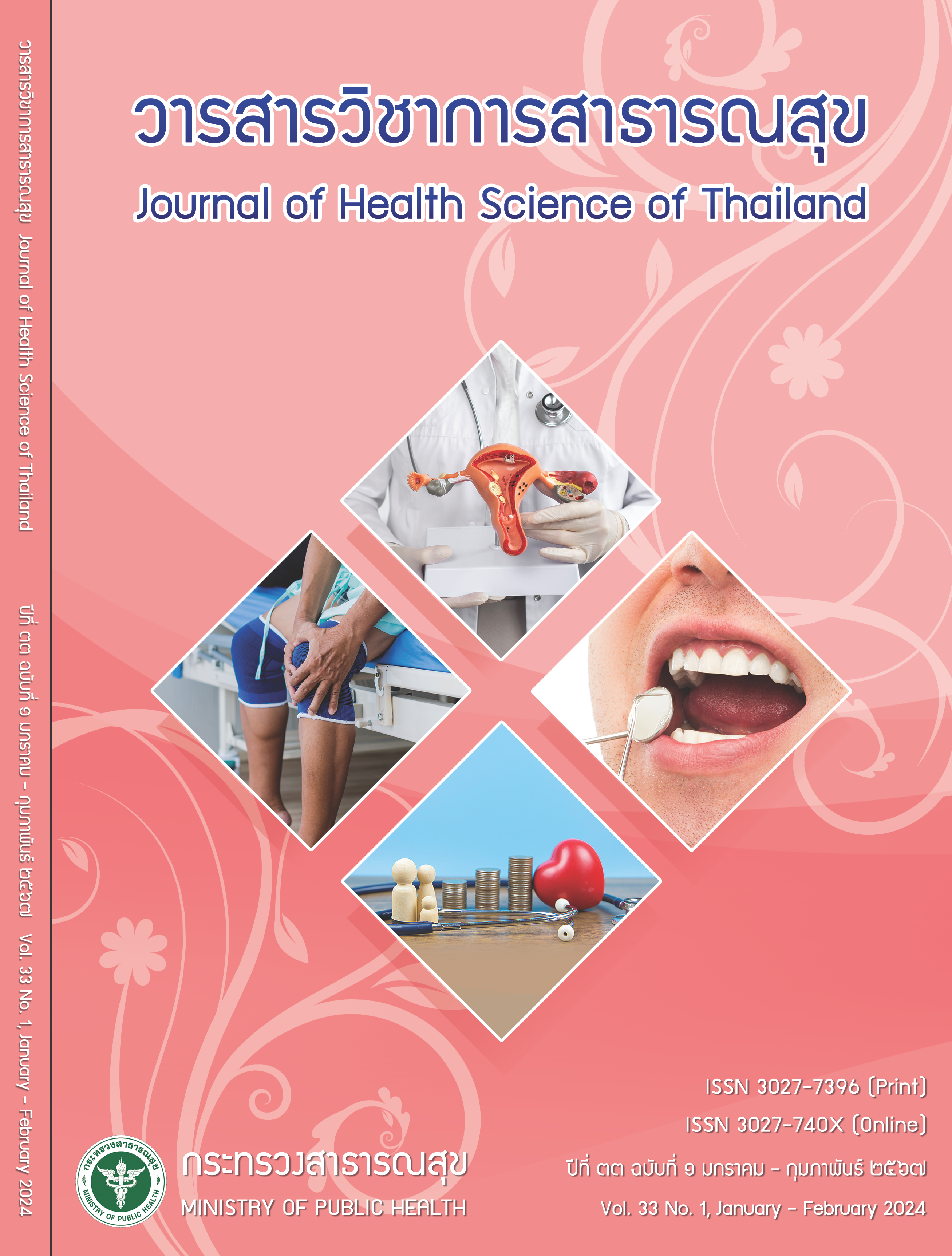Factors Associated with Irrational Antibiotic Use Behaviour among Social Media Users in Thailand
Keywords:
antibiotics, antimicrobial resistance, antibiotic use behaviourAbstract
The antibiotics are currently less effective as the bacteria adapt to resist the antibiotics, resulting in a lower efficacy affecting drug-resistant bacterial infections. Previous research indicated that improper use of antibiotics triggered one of the significant causes of resistance infection. This study aimed to examine factors related to the irrational use of antibiotics among social media users in Thailand. Quantitative research approach was employed in this study, using a cross-sectional survey. Selfadministered online questionnaires were distributed to 400 respondents who were social media users. The study was conducted between February and April 2021. Data were analyzed using the Chi-square test and Pearson correlation analysis. The study found that gender, education level, reason for using antibiotics, income, and source of antibiotic exposure were significantly related to antibiotic utilization behavior. As for the attitude factor, there was a low level relationship with antibiotic use behavior (p<0.001). There was no relationship between knowledge about antibiotic use or antibiotic resistance and antibiotic use behavior (p>0.05). Therefore, the public should be encouraged to have an proper attitude to use antibiotics correctly and appropriately.
Downloads
References
พรพรรณ กู้มานะชัย. ข้อควรรู้เกี่ยวกับการใช้ยาปฏิชีวนะ [อินเทอร์เน็ต]. กรุงเทพมหานคร: สมาคมโรคติดเชื้อแห่ง ประเทศไทย; 2562 [สืบค้นเมื่อ 19 มิถุนายน 2563]. แหล่ง ข้อมูล: https://www.idthai.org/Contents/Views/ ?d=kuF2!8!4!!96!WdT6gcOs
ศูนย์ข้อมูลข่าวสารด้านเวชภัณฑ์ กระทรวงสาธารณสุข. แผน ยุทธศาสตร์การจัดการการดื้อยาต้านจุลชีพประเทศไทย พ.ศ. 2560–2564 [อินเทอร์เน็ต]. 2559 [สืบค้นเมื่อ 19 มิ.ย.2563]. แหล่งข้อมูล: http://dmsic.moph.go.th/index/ detail/6849
Apisarnthanarak A, Mundy LM. Correlation of antibiotic use and antimicrobial resistance in Pratumthani, Thailand, 2000 to 2006. Am J Infect Control [Internet]. 2008 [cited 2020 Jun 19];36(9):681-2. Available from: doi:10.1016/j.ajic.2007.10.022
Taylor JA, Kwan-Gett TS, McMahon EM Jr. Effectiveness of an educational intervention in modifying parental attitudes about antibiotic usage in children. Pediatrics [Internet]. 2003 [cited 2020 Jun 19];111(5 Pt 1):e548-e554. Available from: doi:10.1542/ peds.111.5.e548
เพ็ญกาญจน์ กาญจนรัตน์, ศิริขวัญ บริหาร, วีระศักดิ์ พุทธาศรี. ตัวชี้วัดการใช้ยาอย่างสมเหตุผลของประเทศไทย [อินเทอร์เน็ต]. 2558 [สืบค้นเมื่อ 3 ก.ค. 2563]. แหล่ง ข้ อมูล: https://kb.hsri.or.th/dspace/handle/ 11228/4245?locale-attribute=th
อิสรีย์ฐิกา ชัยสวัสดิ์ จันทร์ส่องสุข, นิภาพร เอื้อวัณณะโชติมา, พาสน์ ทีฆทรัพย์. การวิเคราะห์พลวัตระบบของปัจจัยที่ส่งผล ต่อพฤติกรรมการใช้ยาปฏิชีวนะอย่างสมเหตุสมผลในภาค ประชาชน รูปแบบระดับจังหวัด: กรณีศึกษาจังหวัดนครนายก [อินเทอร์เน็ต]. 2562 [สืบค้นเมื่อ 3 ก.ค. 2563]. แหล่ง ข้อมูล: https://kb.hsri.or.th/dspace/handle/11228/ 5195?locale-attribute=th
United Nations. High-level meeting on antimicrobial resistance [Internet]. 2016 [cited 2020 Jul 3]. Available from: https://www.un.org/pga/71/event-latest/ high-level-meeting-on-antimicrobial-resistance/
Cochran WG. Sampling technique. 2nd ed. New York: John Wiley and Sons; 1963.
Best JW. Research in education. 3rd ed. Englewood Cliffs, New Jersey: Prentice Hall; 1977.
Demoré B, Mangin L, Tebano G, Pulcini C, Thilly N. Public knowledge and behaviours concerning antibioticuse and resistance in France: a cross-sectional survey. Infection [Internet]. 2017 [cited 2020 Jun 19];45(4):513-20. Available from: doi:10.1007/ s15010-017-1015-2
Awadh A, Raja A, Mahdi A. Assessment of knowledge, attitude and practice regarding antibiotics misuse among the public in Saudi Arabia. The Egyptian Journal of Hospital Medicine [Internet]. 2017 [cited 2020 Jun 19]; 69(5):2405-11. Available from: doi: 10.12816/ 0041684
นัชชา ยันติ. ปัจจัยที่มีความสัมพันธ์ต่อพฤติกรรมการใช้ยา ปฏิชีวนะของนักศึกษาหลักสูตรสาธารณสุขศาสตร์ มหาวิทยาลัยแห่งหนึ่ง จังหวัดปทุมธานี. วารสารวไลยอลงกรณ์ปริทัศน์(มนุษยศาสตร์และสังคมศาสตร์) 2560;7(2):57-66.
Pereko DD, Lubbe MS, Essack SY. Public knowledge, attitudes and behaviour towards antibiotic usage in Windhoek, Namibia. S Afr J Infect Dis [Internet]. 2015 [cited 2020 Jun 19];30:134–7. Available from: doi: 10.1080/ 23120053.2015.1107290
Jose J, Jimmy B, Alsabahi AG, Al Sabei GA. A study assessing public knowledge, belief and behavior of antibiotic use in an Omani population. Oman Med J [Internet]. 2013 [cited 2020 Jun 19];28(5):324-30. Available from: doi:10.5001/omj.2013.95
Keaw-aun R., Thaikhamnam K., Suttisean P., Wisai S., Suphim B. Antimicrobial using behaviors: case study of Ban Kang Pla population, Chaiyapruek Sub-district, Mueang District, Loei Province. Ubru Journal for Public Health Research [Internet]. 2019 [cited 2020 Jun 19];8(2):43-54. Available from: https://he02. tci-thaijo.org/index.php/ubruphjou/article/ view/240311
Hagiya H , Ino H, Tokumasu K, Ogawa H, Miyoshi T, Ochi H, et al. Antibiotic literacy among Japanese medical students. J Infect Chemother [Internet]. 2020 [cited 2021 Jan 30];26(10):1107-9. Available from: doi: 10.1016/j.jiac.2020.06.021
สำนักงานพัฒนานโยบายสุขภาพระหว่างประเทศ กระทรวงสาธารณสุข, สำนักงานสถิติแห่งชาติ กระทรวงดิจิทัลเพื่อ เศรษฐกิจและสังคม. การใช้ยาปฏิชีวนะอย่างเหมาะสม และ เชื้อดื้อยาต้านจุลชีพของประชาชนในประเทศไทย: ผลการ สำรวจอนามัยและสวัสดิการ พ.ศ. 2562 [อินเทอร์เน็ต]. [สืบค้นเมื่อ 3 ก.ค. 2563]. แหล่งข้อมูล: https://www. nso.go.th/sites/2014/Pages/News/2562/N14-03- 62-1.aspx
ทิพวรรณ วงเวียน. ความรู้เกี่ยวกับการใช้ยาปฏิชีวนะใน โรคติดเชื้อเฉียบพลันของระบบทางเดินหายใจส่วนบนของผู้ป่วยนอกที่เป็นโรคดังกล่าวในโรงพยาบาลสมเด็จพระบรมราชเทวี ศรีราชา. วารสารเภสัชกรรมไทย 2557;6(2): 106-14.
Haenssgen MJ, Charoenboon N, Zanello G, Mayxay M, Reed-Tsochas F, Lubell Y, et al. Antibiotic knowledge, attitudes and practices: new insights from cross-sectional rural health behaviour surveys in low-income and middle-income South-East Asia. BMJ Open [Internet]. 2019 [cited 2021 Jan 30];9:e028224. Available from: doi: 10.1136/bmjopen-2018-028224
Bloom BS. Taxonomy of educational objectives: the classification of educational objectives. Handbook I: the cognitive domain. New York: McKay; 1964.
Downloads
Published
How to Cite
Issue
Section
License
Copyright (c) 2024 Ministry of Public Health

This work is licensed under a Creative Commons Attribution-NonCommercial-NoDerivatives 4.0 International License.







